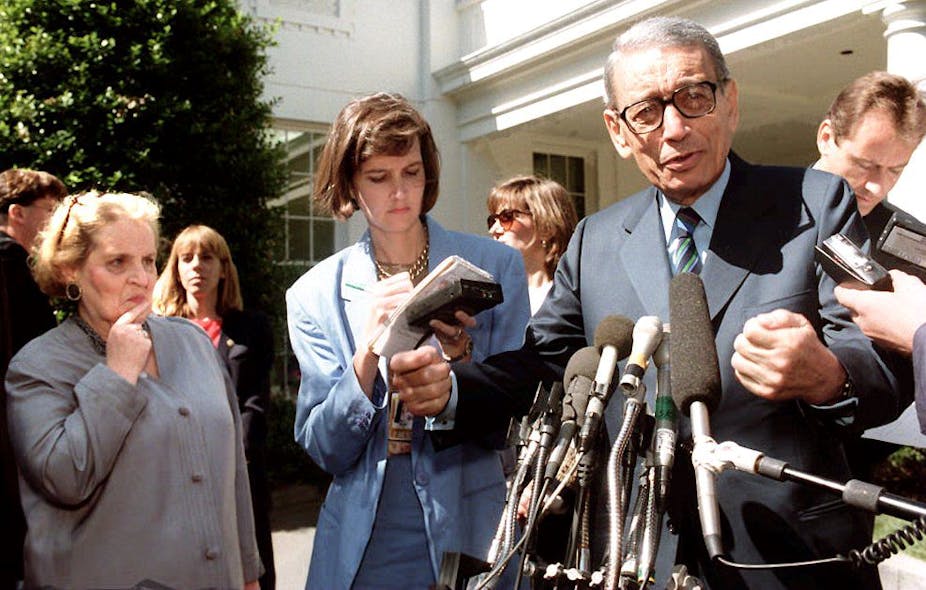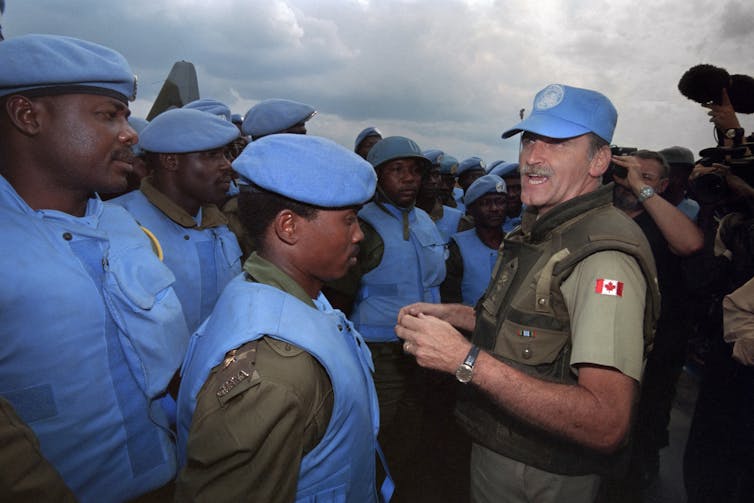“Rwanda’s genocide could have been prevented: 3 things the international community should have done – expert”, The Conversation
Walter Dorn, Professor of Defence Studies, Royal Military College of Canada, April 9, 2024
As the world marks the 30th anniversary of the 1994 genocide against the Tutsi ethnic group in Rwanda, it is important to understand what the international community could have done to prevent it.

In one hundred days an estimated 600,000 to 800,000 Rwandans were killed. The Tutsi were targeted primarily due to long-standing ethnic tensions between the Tutsi minority and the majority Hutu population. Tutsi sympathisers and moderate Hutus were also targeted.
As the mass killings were happening, the international community stood by in a stupor, even though the nations of the world had a legal and moral obligation to intervene in cases of genocide. The United Nations also had a responsibility to maintain international peace and security.
To its credit, the United Nations had already put in place a peacekeeping mission, the United Nations Assistance Mission for Rwanda (Unamir). It was established in 1993 to support the Arusha accords, which aimed at ending the civil war in Rwanda.
Could Unamir have prevented the genocide? Being a student of peacekeeping history, I sought to learn from the UN experience. I wrote a detailed paper on whether the genocide could have been predicted and prevented. In my view this was possible but would have required three main things: detailed intelligence, preventive measures and political will.
These components can still be applied to genocide prediction and prevention, and to protection of civilians, in other war-torn countries – whether it be Gaza, Haiti, Sudan, Yemen, or Ukraine – though the methods to achieve these three components will be different in each case.
Detailed intelligence
In Rwanda, intelligence-gathering could have provided clear and sufficient clues about the genocide months in advance.
Information from many sources, including informants, journalists and human rights investigators, showed illicit arms flows, training and preparations by the Interahamwe (a Hutu extremist militia group), insider plotting for “the apocalypse”, the names and reputations of the plotters, and a long-standing pattern of ethnically based human rights violations.
Unfortunately, the UN mission felt deaf and blind in the field as it did not have the analytical capacity to synthesise these important pieces of evidence. It was also prevented by UN headquarters from taking measures to secure more information and taking steps for prevention.
Preventive action
Since early warning of the Rwandan genocide was clearly possible for the UN, could it have actually prevented the genocide?
Had the UN taken deterrent actions early on, it might have been able to stop the genocide at the outset. Later, a large deployment of troops would have been needed to bring a halt to the many senseless killings.
UN preventive actions should have dealt with people (both plotters and resisters), the genocide structures (networks) and the tools (weapons) of the genocide.
In response to illicit weapons flowing into Kigali, the peacekeeping force should have firmly applied the embargo.
Since a network of Rwandan officials was being trained to carry out genocide, a few selected individuals in the chain of command should have been influenced, isolated and turned by their foreign trainers and UN contacts.
International officials should have exposed the international aid diversion, which was suspected in Interahamwe training.
Additional pressure could have been applied to reduce the level of threatening propaganda and to shut down extremist radio stations.
After the start of the genocide on 6 April, the UN should have taken these steps. But high-ranking officials of both the UN and its member states, particularly the United States, failed even to recognise and publicly declare the genocide, even as tens of thousands were being slaughtered.
Early recognition of the unfolding genocide would have focused more international attention, increasing pressure by NGOs and an outraged public to stop the killings immediately, and caused the Security Council to strengthen Unamir at an early stage. Instead, the systematic killing of Tutsis was inaccurately portrayed as another example of “ethnic violence”.

Unamir commander Roméo Dallaire, myself and others have argued that a small, intervening force with a robust mandate could have intervened to prevent genocide, particularly in the early days. The UN secretary-general at the time, Boutros Boutros-Ghali, affirmed his belief in November 1994 that as few as 400 troops could have “saved the situation”. These remarks suggest that the killers were so lightly armed and poorly trained that even the most skeletal of intervening forces could have overwhelmed them.
Quick, decisive action by the UN might have isolated the genocide to the Kigali sector before it spread into the countryside. What was provided much later was a unilateral French force, under Operation Turquoise. Turquoise was not the right kind of intervening force – it didn’t have the mandate to actively stop the genocide. And it deployed too late.
Finally, the Security Council could have authorised a strong UN mission to establish safe havens in strategic locations in Kigali and the Rwandan countryside. In fact, the UN did protect some locations in Kigali – at the Milles Collines Hotel, the King Faisal Hospital, and the city’s main stadium. Some 15,000 refugees (mostly Tutsis) were saved at the hospital, thanks to the efforts of the Bangladeshi and later Ghanaian soldiers who guarded it.
Political will
So, the UN should have developed a better information system and taken preventive measures. What prevented it from doing so? The simple answer is a lack of political will.
The main reason for this broad lack of resolve was that the dominant member of the UN – the United States – was viewing UN peacekeeping cautiously and with fear of over-involvement.
The lack of US commitment was largely the result of a disastrous mission in Somalia the previous year.
Without US leadership and support, other states were hesitant to commit themselves politically or militarily. Instead Unamir was cut to just 10% of its personnel. Still, these peacekeepers managed to save 20,000 to 30,000 lives, showing what dedicated action from a small force can achieve.
Moving forward
What, then, is necessary for political will to be developed to prevent future atrocities like Rwanda?
Primarily it is a matter of fostering a sense of enlightened self-interest among all nations, linking human welfare around the globe with one’s own. It means recognising that when crimes against one section of humanity are committed, no matter where, it is a crime against all of humanity.
If this isn’t enough, then the fear of inaction should also be a motivating force.
Another motivating force can be international law. Under the Genocide Convention, nations are obliged to prevent this horrendous crime against humanity.
The lesson of Rwanda is clear: we must build international political will, as well as an enhanced UN capability, for prevention.
Traditionally UN peacekeeping missions were primarily mandated to monitor ceasefires and separate conflicting parties, but since 1999 they’ve been tasked with protection of civilians caught in conflict zones. But the means to achieve that goal are still lacking.
The UN has greatly developed its ability for gathering and analysing information in its peacekeeping missions, but it still needs rapid reaction forces.
The world community owes it to the hundreds of thousands of innocent human beings who were slaughtered during the Rwandan genocide to try to predict and prevent future genocides and mass atrocities.